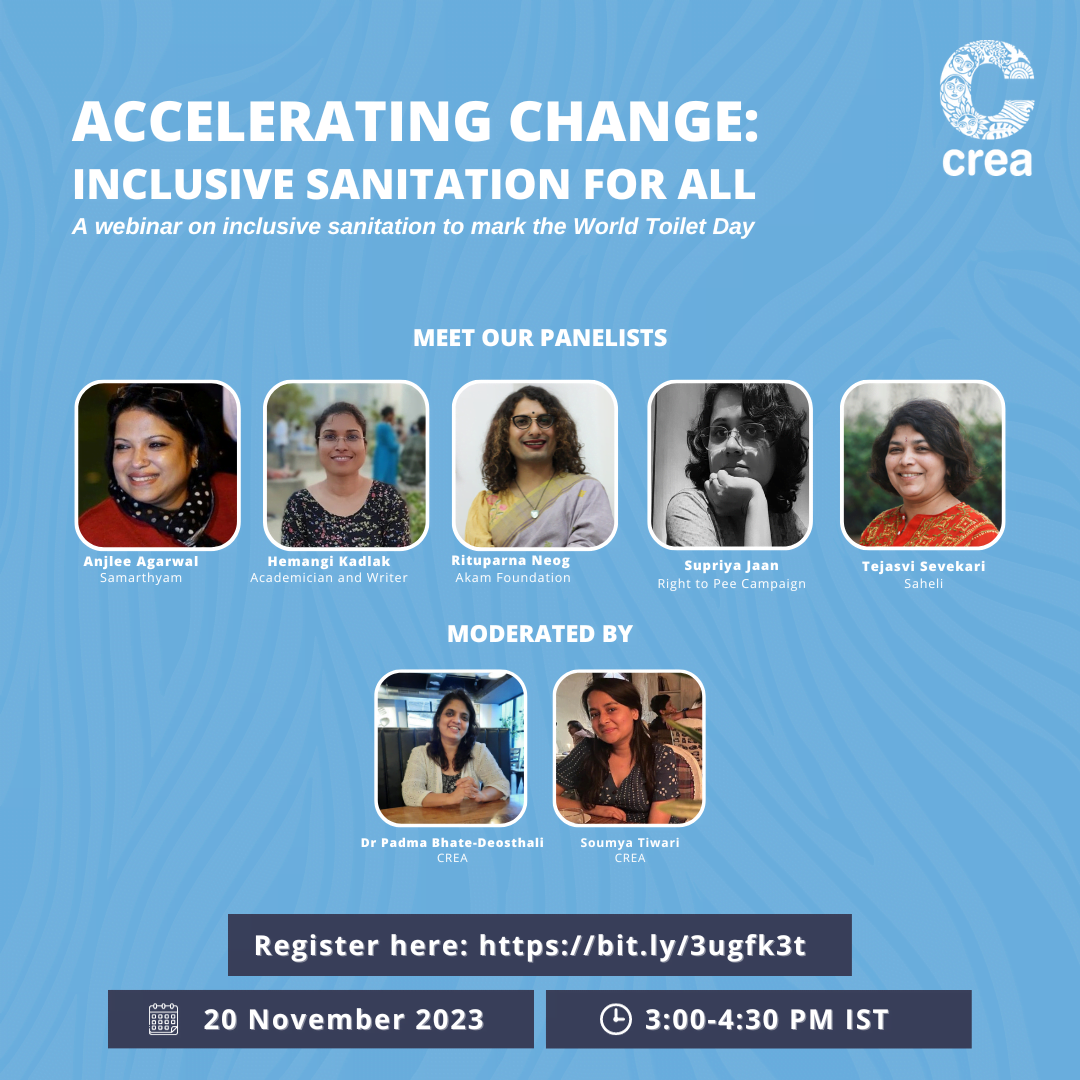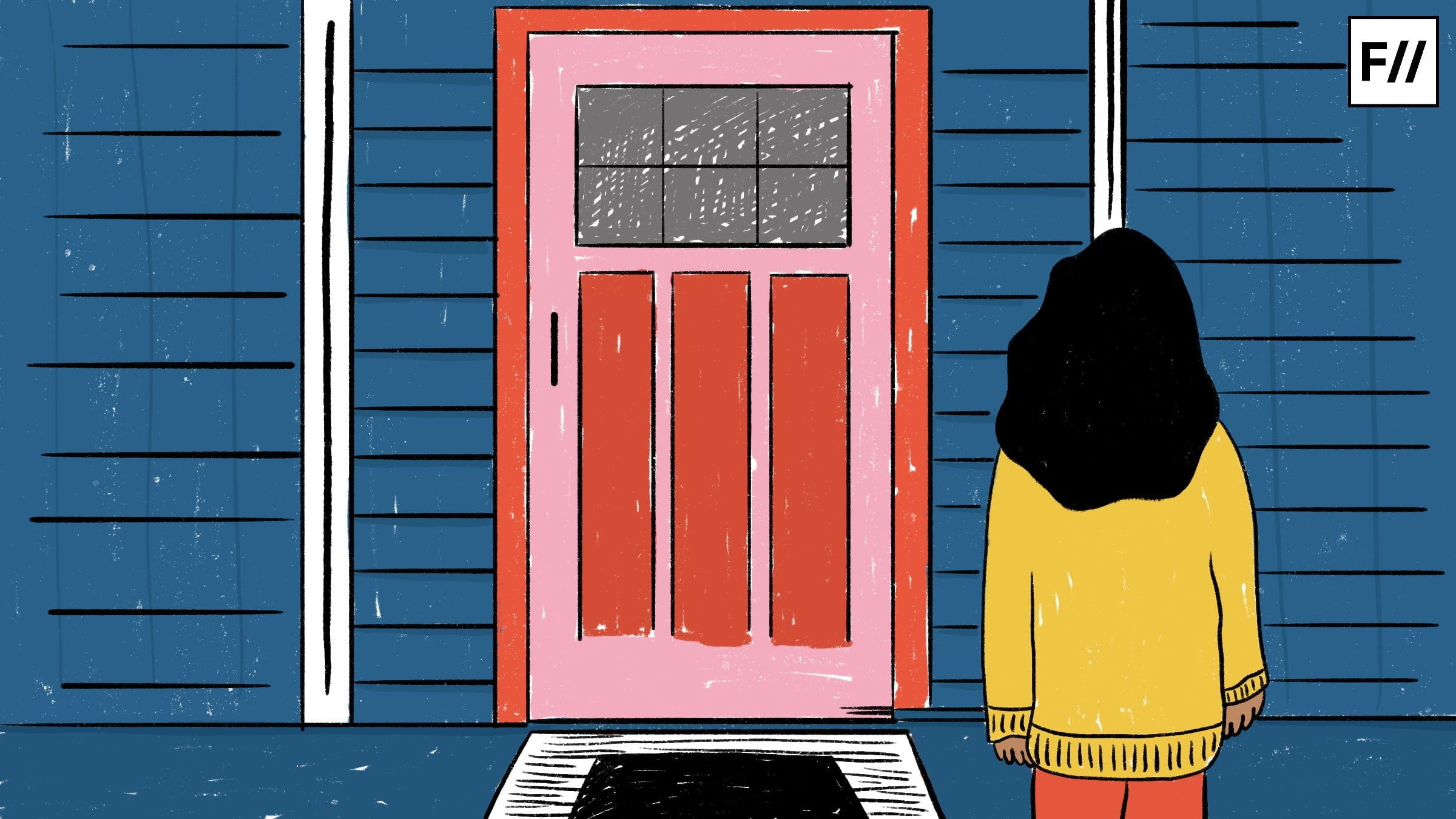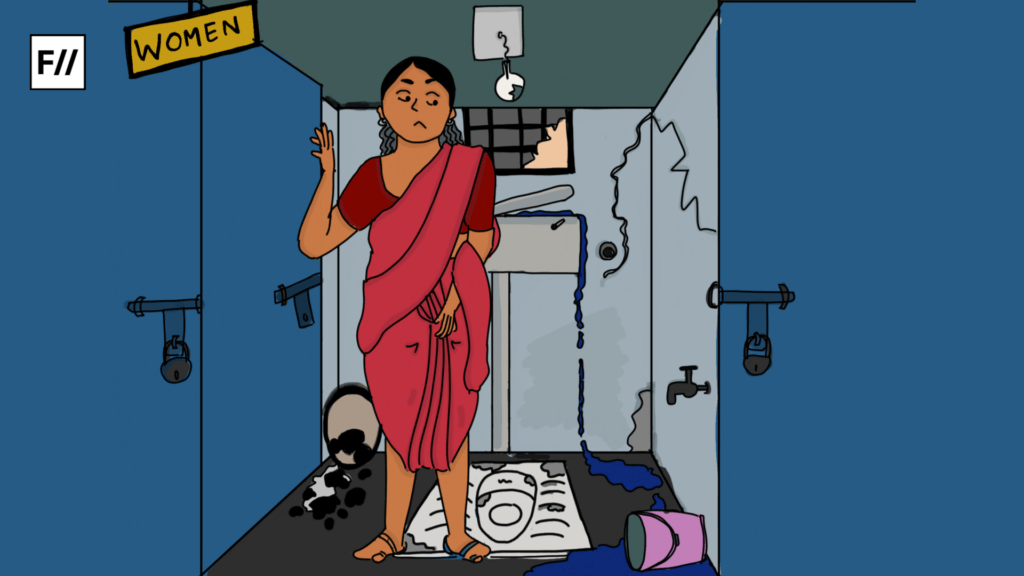Women, adolescent girls, elderly persons with disabilities, sanitation workers and waste segregators are [still being] systematically excluded from safe and adequate hygiene and sanitation services. They are further excluded from decision-making processes, even though there are specific challenges regarding access to water and sanitation. This lack of voice needs to be addressed.
WSSCC & FANSA 2016
In 2001, the World Toilet Organization declared November 19 as World Toilet Day, to bring global attention to the crucial need for toilets worldwide. And, since 2010, when the UN declared the human right to water and sanitation a basic human right, World Toilet Day has been observed every year to renew the effort on improving access to toilets and better sanitation.
CREA initiated its work on water sanitation and hygiene (WASH), focusing on urban sanitation, under its sexual and reproductive health program in 2021. Since then, CREA has worked with WASH practitioners and state technical units to integrate issues of gender and rights in existing state program implementation in urban sanitation.

With the theme ‘Accelerating Change’, CREA hosted a webinar to accelerate the movement for inclusive sanitation for all. The webinar brought together perspectives of the feminist, disability, caste and trans rights movements on accessible and safe sanitation for all. The panel included Anjlee Agarwal, Samarthyam; writer and academic Hemangi Kadlak; Rituparna Neog, Akam Foundation; Supriya Jaan, ‘Right to Pee’ campaign; and sex workers’ rights activist Tejaswi Sevekari, Saheli Foundation. The session was moderated by CREA’s Dr Padma Bhate-Deosthali and Soumya Tiwari.
Accessible, safe, and free toilets
Access to safely managed sanitation systems – in homes, schools, workplaces, marketplaces, health care facilities, government buildings and other public spaces as well as institutional settings – is essential. Poor sanitation disproportionately affects the most vulnerable and disadvantaged groups, particularly women, trans persons and people living with disabilities. The impact of poor sanitation services on women and girls is multi-pronged and leads to increased burden of work, poor health of self and family, violation of privacy, safety, dignity, gender-based violence, and threat to their livelihoods.
At the webinar, Supriya Jaan spoke about the women-led movement Right to pee, which started in 2011 in Mumbai by a community-based organisation CORO when they found 2340 free urinals for men, but zero urinals for women, in public spaces. Jaan discussed the innovative ways in which the campaign has demanded an increase in the number of toilet seats for women, free access to pee, and raised issues of access to water, electricity and safe disposal of waste.
Anjlee Agarwal, founder of the disability rights NGO Samarthyam, highlighted how the absence of safe and accessible sanitation facilities has greater consequences for women and women with disabilities. She shared the findings of a study that found that 85% of women with disabilities in Delhi had kidney stones ‘they were taking less water, especially when they were out of the house for job, markets, schools and colleges. In the absence of accessible toilets, these women would not drink water.’
Rituparna Neog, transgender rights activist and founder of the Akam Foundation, spoke about the harassment that members of the trans community encounter when they attempt to access segregated toilets (demarcated as male and female).
Rituparna Neog, transgender rights activist and founder of the Akam Foundation, spoke about the harassment that members of the trans community encounter when they attempt to access segregated toilets (demarcated as male and female). The lack of toilet facilities for trans persons forces them to make the difficult decision of choosing between men’s or women’s toilets, an impossible choice because they are usually denied entry or face discrimination and even violence at both. She also recounted how the absence of sanitation facilities for trans and queer communities has emotionally debilitating effects: ‘In school, I would often get scolded by my teacher after the interval because I would be late for class by 7–8 minutes. I had to wait in front of the washroom for all the boys to vacate before I could go in.’
Neog shared other stories of trauma, fear and anxiety among people in the trans community, describing instances where they are forced to hold their pee all day long for lack of access to safe toilets. In some cases, this has caused trans persons to drop out of college, demonstrating the link between the right to pee and the right to education.

Expanding the discussion to the community of sex workers, Tejaswi Sevekari, executive director of Pune-based CBO Saheli, spoke of the apathy of local civic bodies in ensuring proper sanitation and waste disposal mechanisms in red-light areas. Sex workers constitute a highly excluded community, who often do not have access to safe and accessible toilets with clean water, soap and menstrual health provisions. Sevekari described how, during the COVID-19 outbreak, the sex worker community faced greater problems in accessing water and sanitation facilities because they were considered ‘reservoirs and spreaders’ of the deadly virus. Sanitation staff refused to work in their area and complaints regarding the blockage of toilets remained unattended to for days on end.
Sanitation workers – the dynamics of caste, gender, and its intergenerational impact
Academic Hemangi Kadlak discussed in detail how the present situation of sanitation workers in India reflects the continued indifference of society at large and how that apathy is reflected in India’s policies and programs. Sanitation work is not an ‘occupation’, Kadlak reminded us, but ‘forced labour’, since there is no semblance of honour or dignity in manual scavenging. Families of sanitation workers remain trapped in circumstances that force them to keep performing unsafe and humiliating sanitation work, despite the heavy price they pay for it. The nature of their work exposes them to occupational hazards such as long-term illness or disability as well as an unacceptably high chance of accidental death. Children of sanitation workers also have to face the consequences, their health suffers and they grow up internalising the idea that their professional fate will not be very different from their parents. Kadlak also pointed to how none of the policies and programs take into account the persistent caste-based stigma against sanitation work.
Kadlak expressed her deep concern about girls in the community who are compelled to drop out of school because they have to perform household duties. ‘Very few girls make it to colleges, not even a handful’, she said; the few who do make it to higher educational institutions ‘do not disclose their identity’ to avoid the inevitable prejudice this triggers.
Recommendations
The Swachh Bharat Mission (SBM) through its guidelines recognises the importance of adequate sanitation and specifically states that ‘adequate provision for separate toilets and bathing facilities for men, women and the physically disabled’ must be ensured. However, Anjlee Agarwal pointed out that having a ramp and a Western toilet doesn’t make a particular facility necessarily and adequately disabled-friendly. Agarwal recommended adopting standardised guidelines that are based on the universal design approach to ensure safe and accessible sanitation for all with a focus on persons with disabilities.

Despite carrying the disproportionate burden of the impact of poor sanitation services, women and other structurally excluded groups are kept out of the decision-making and policy planning efforts. There is a need to have women, women with disabilities and trans persons on the decision-making board of policies and programs so that they can share insights and suggestions on infrastructural and architectural modifications, and inform the design of new projects. Rituparna Neog, through her campaign #nomoreholdingmypee, has been advocating for creating accessible toilets for queer and trans persons in higher educational institutions in Assam. She wishes for the campaign to grow and advocate for accessible sanitation facilities for transgender individuals in public transportation systems and infrastructure, including at airports, bus stops and railway stations.
Supriya highlighted how the right to pee campaign running since 2011 by women in Mumbai to demand free, safe and accessible urinals for women, transpersons, the elderly, children and persons with disabilities needs to expand to other states. She also recommended that merely handing over the operation and maintenance of toilets to self-help groups (SHGs) is not enough as they need continued support through the allocation of resources, capacity building and coordination with various local authorities.
Hemangi Kadlak recommended looking at centuries of caste oppression and decades of policy neglect to address the relationship of caste and sanitation work, which requires actionable commitment from the government.
Hemangi Kadlak recommended looking at centuries of caste oppression and decades of policy neglect to address the relationship of caste and sanitation work, which requires actionable commitment from the government. The sanitation sector should acknowledge the particular challenges that women sanitation workers face and should develop targeted initiatives capable of effectively tackling these challenges. She added that supporting the families of sanitation workers in transitioning out of work is critical to this promise.
Key takeaways
The webinar highlighted the need for continuous deliberation and inclusive participation by a wide range of social groups in sanitation policies and decision-making at all levels from local to national, regional and international institutions. The importance of recognising gender issues within the larger discourse of sanitation was emphasised by all the speakers. There was also an agreement about strategies that address and respond to various forms of injustices related to access to sanitation and sanitation workers.
Written by Soumya Tiwari, Program Associate at CREA.



